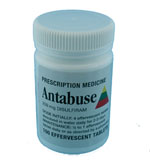|
Antabuse
(Disulfiram) is one of the medications most widely
used for the treatment of alcohol abuse and alcohol dependence all
over the world. Introduced as early as 1948, Antabuse was the first
medication approved for that purpose by FDA in the US.

How does it work?
When being taken, Antabuse causes negative physical reactions in
the person who consumes alcohol. They may stop the person from
drinking more alcohol and help him or her quit drinking completely.
What is the mechanics?
In the system, alcohol is metabolized in two steps. First, it is
changed into a very toxic substance called acetaldehyde. Then,
acetaldehyde is oxidized further into a harmless acetic acid.
Hangover symptoms are experienced on the first stage, when the
body is stuffed with acetaldehyde. Antabuse stops oxidizing
acetaldehyde into acetic acid. That is why when the person
ingests alcohol during Antabuse treatment, the body accumulates
5 to 10 times more acetaldehyde as compared to the amount of it
formed in the system when the same dose of alcohol is taken alone.
As a result, the person feels very uneasy.
What sort of uneasiness
does one experience?
Unpleasant reactions include: nausea and vomiting, sweating,
extreme thirst, flushing, bad headache, heartbeat, chest pain,
hypotension, weakness, trembling, dizziness, blurred vision,
confusion and inhibition of thinking. In more severe cases,
one may suffer from respiratory depression, cardiovascular
collapse, myocardial infarction, acute congestive heart
failure, unconsciousness, arrhythmias and convulsions. In
very bad cases, combining Antabuse with alcohol may cause death.
But it is a real poison!
Why should I use it?
You should only use it if you are fully aware of the consequences
of combining alcohol and Antabuse, and you are definite about
your decision to quit drinking. If you are going to use the
medication in someone else, that person must know the details
about Antabuse treatment, too.
When should Antabuse
be avoided?
1) Antabuse should by no means be used in anyone with a story of
serios cardiovascular problems, or psychosis. 2) Antabuse should
not be given to anyone with an allergy to Disulfiram. 3) Antabuse
should not be taken during the periods of alcohol intoxication.
4) Antabuse should not be taken by pregnant women. 5) Antabuse
should never be combined with metronidazole. 6) Antabuse should be
used with caution in patients taking phenytoin and paraldehyde,
amphetamines, warfarin, diazepam, amitriptyline, pethidine,
morphine and antipyrine.
Does Antabuse make drinking impossible?
Antabuse just makes drinking unpleasant. Unfortunately, it does
not reduce the person's craving for alcohol. It all depends on
the person's determination to stay sober. Antabuse is only
effective if taken every day. If someone stops taking Antabuse,
alcohol can be consumed without any risk of excessive hangover
symptoms in just a few days when the medication is completely
removed from the system. However, patients on Antabuse do not
develop tolerance to the medication, and the longer the period
Antabuse is taken, the more sensitive the patient becomes to
alcohol.
ANTABUSE DOES NOT TREAT ALCOHOL WITHDRAWAL SYMPTOMS!
How is Antabuse taken?
Antabuse can only be taken 24 hours or more after the last dose of
alcohol.
When using 200 Mg tablets, Antabuse is initially taken 4 tablets
(800 Mg) on the 1st day, 3 tablets (600 Mg) on the 2nd day, 2 tablets
(400 Mg) on the 3rd day, and 1 tablet on the 4th day. Then half to
one tablet (100-200 Mg) each day during the period determined by
the physician.
When using 250 Mg tablets, Antabuse is initially taken 3 tablets
(750 Mg) on the 1st day, 2 tablets (500 Mg) on the 2nd and 3rd day,
and 1 tablet on the 4th day. Then half to one tablet (125-250 Mg)
each day during the period determined by the physician.
There exists a different schedule which demands using a maximum of
500 Mg of Antabuse daily, which is given in a single dose for 1 to 2
weeks in the 1st phase of treatment. In the 2nd phase of treatment,
the maintenance dose is 125 Mg to 250 Mg daily.
|